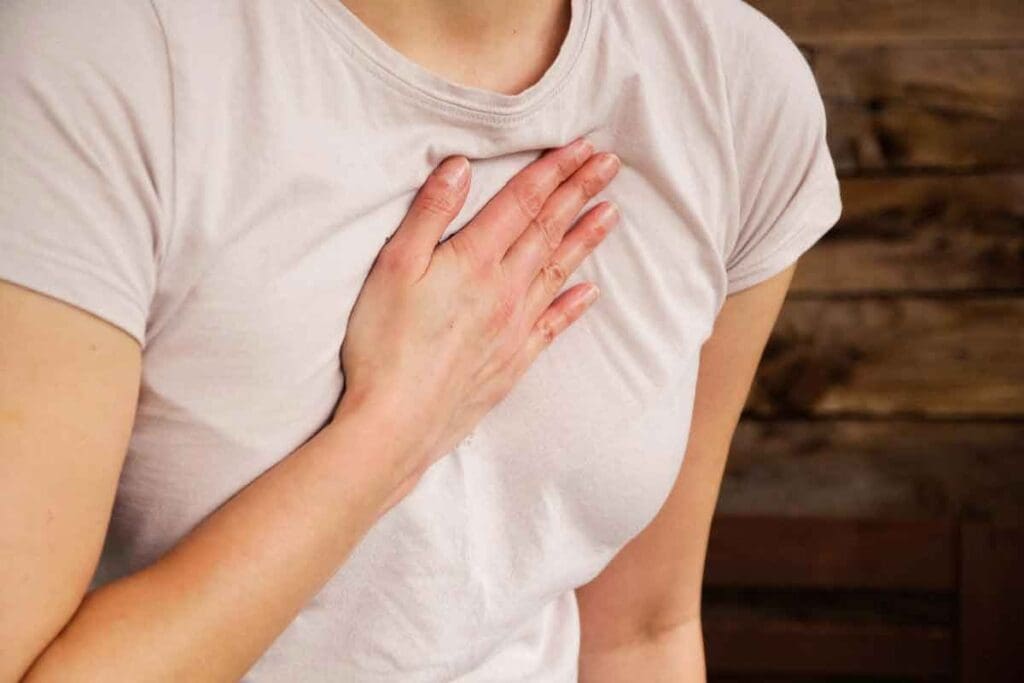Last Updated on November 14, 2025 by Ugurkan Demir

Iron deficiency is a common issue that can cause many symptoms. These include tiredness and heart palpitations, as well as changes in skin and appetite.
Iron is key for keeping the brain, immune system, muscles, skin, hair, and nails healthy. Without enough iron, the body can suffer from iron deficiency anemia, which often leads to fatigue, pallor, and breathlessness. Many people wonder, does low iron make you tired? Yes — tiredness is one of the most common signs of low iron levels in the body.
At Liv Hospital, we focus on our patients. Our team helps them understand the hidden signs and reasons behind iron deficiency.

Iron deficiency is more common than many think. It affects a lot of people worldwide, including the United States.
Iron is key for our bodies. It helps make hemoglobin, which carries oxygen in our blood. Without enough iron, our bodies don’t get enough oxygen, causing health problems.
Several things can lead to iron deficiency. These include:
Iron deficiency is a big health issue in the United States. Recent stats show:
| Demographic Group | Prevalence of Iron Deficiency |
| Women of Childbearing Age | 12% |
| Pregnant Women | 18% |
| Children Under 5 Years | 7% |
| General Population | Up to 8% |
These numbers show iron deficiency affects many groups. Up to one-third of Americans might not have enough iron, making it important to know about it and prevent it.
Knowing about iron deficiency is key to fighting it. By understanding who is most at risk, we can work to prevent and treat it.

Low iron levels can make you feel tired. This is because iron helps carry oxygen and produce energy. Iron is key in making hemoglobin, a protein in red blood cells. It carries oxygen to all parts of the body.
Iron is vital for keeping your energy up. It helps transport oxygen to your body’s tissues and organs. Hemoglobin, with iron, picks up oxygen in the lungs and sends it to your muscles and other tissues.
When iron is low, your body can’t carry enough oxygen. This makes you feel tired and weak.
Without enough iron, your cells don’t get enough oxygen. Oxygen is needed to make energy. This can cause tiredness, weakness, and shortness of breath.
Iron is also needed for making ATP, the energy for cells. Mitochondria, the energy makers in cells, use iron to make ATP. Low iron means less energy, leading to tiredness and fatigue.
In short, low iron affects oxygen transport and energy making. This leads to tiredness and other symptoms. Knowing this helps find the right treatment for fatigue.
Persistent fatigue is a key sign of iron deficiency, affecting millions globally. It’s not just feeling tired. It’s a deep exhaustion that can change daily life.
Fatigue can have many causes, making it hard to spot iron deficiency just by feeling tired. Iron-related fatigue stands out because it doesn’t go away with rest. Unlike regular tiredness, it keeps coming back even after you’ve slept well.
“Fatigue is the most common symptom of anemia, and it’s likely the most noticeable.” This shows how important it is to see fatigue as a sign of iron deficiency.
If tiredness doesn’t get better with rest, it might mean you have iron deficiency. This kind of fatigue can really slow you down. It affects not just your body but also your mind and feelings.
If you’re tired all the time and can’t shake it, see a doctor. They can find out why and help you feel better.
“Iron deficiency is often overlooked as a cause of fatigue, but it’s a critical factor to consider in diagnosis.”
It’s key to understand how iron deficiency and fatigue are linked. By knowing the signs and what causes them, you can get the right help. This can greatly improve your life.
Heart palpitations and low iron are more than just a coincidence. They are a serious health issue that needs attention. Heart palpitations feel like an irregular heartbeat or a pounding heart in the chest. They can be scary and are linked to many health problems.
Iron is key for carrying oxygen to the body’s parts, including the heart. When iron levels drop, the heart works harder to get oxygen to organs. This extra effort can cause heart palpitations.
Iron deficiency means less hemoglobin, a protein in red blood cells that carries oxygen. With less oxygen, the heart pumps more blood. This can lead to palpitations.
Key factors contributing to heart palpitations in iron deficiency include:
It’s important to know the signs of heart palpitations to spot iron deficiency. Symptoms include:
| Symptom | Description |
| Irregular heartbeat | Sensation of skipped beats or irregular rhythm |
| Pounding or fluttering | Feeling of the heart pounding or fluttering in the chest |
| Rapid heartbeat | Noticeably faster heart rate than usual |
If you have ongoing or severe heart palpitations, see a doctor. They can check if iron deficiency is the cause. They will then suggest the right treatment.
Iron deficiency, shown by low ferritin levels, deeply affects the heart. Ferritin stores iron, and its levels show if we have enough iron.
Ferritin holds iron, releasing it when the body needs it. Low ferritin levels mean we don’t have enough iron. This can harm our heart health.
The heart, a muscle that never stops, needs oxygen to work right. With low ferritin, the heart works harder. This can cause heart problems.
Low ferritin heart palpitations make the heart beat irregularly or too hard. This is because the heart muscle doesn’t get enough oxygen. The heart works harder to pump blood, causing palpitations.
Iron is also key for making hemoglobin, which carries oxygen. With iron deficiency palpitations, the heart rate can become irregular. This makes palpitations worse.
It’s important to understand how low ferritin levels affect the heart. Treating iron deficiency early can help the heart and overall health.
Iron deficiency can affect your skin and nails in ways you might not notice. Iron is key for healthy skin, hair, and nails. Without enough, you might see changes.
Dry skin is a sign of iron deficiency. Without enough iron, your skin’s moisture barrier can break down. This leads to dryness and irritation.
Low iron levels can reduce sebum production. Sebum keeps your skin moist. So, your skin might get dry, itchy, and flaky.
Dry skin from iron deficiency can also cause eczema or dermatitis. It’s important to find and fix the root cause for relief.
Brittle nails are another sign of iron deficiency. Iron is vital for nail health. Without it, nails can become weak and brittle.
Nails may also develop ridges or become concave. This is called koilonychia. Iron helps keep nails strong. Without it, nails can become fragile.
Iron deficiency can change how much you want to eat. You might not feel hungry or have strange cravings. These changes can affect how much nutrition you get and your health.
Yes, low iron can make you feel less hungry. Iron is important for digestion and metabolism. When you don’t have enough, your body can’t control hunger well.
Loss of appetite from iron deficiency can lead to poor nutrition. This makes the problem worse. It’s important to notice this symptom to fix the issue quickly.
Some people with iron deficiency have unusual cravings, known as pica. Pica is when you want to eat things that aren’t food or aren’t usually eaten.
| Common Cravings in Pica | Description |
| Ice (Pagophagia) | Craving ice or frozen foods, which can be a sign of iron deficiency. |
| Dirt or Clay (Geophagy) | Eating dirt or clay, which can be associated with iron deficiency among other conditions. |
| Starch | Craving starch, such as cornstarch, is another form of pica linked to iron deficiency. |
Pica can show that you’re not getting enough nutrients, like iron. It’s important to notice and deal with these cravings to keep iron levels up and stay healthy.
It’s key to understand how iron deficiency affects appetite. If you notice big changes in how hungry you are or have strange cravings, see a doctor.
When your body doesn’t have enough iron, you might feel breathless and dizzy. This can really affect your daily life. Iron is key for carrying oxygen to all parts of your body. Without enough, you can face many health problems.
Iron deficiency can make you tired or out of breath when you exercise. This is because your body can’t carry enough oxygen during physical activities.
These symptoms are tough for people who are active or have jobs that need a lot of physical work.
Lightheadedness and fainting episodes are common with iron deficiency. Not enough iron can lower blood pressure and reduce oxygen to the brain, causing these symptoms.
In severe cases, iron deficiency can lead to:
Seeing these symptoms early and getting medical help is very important.
Iron deficiency can cause headaches and trouble focusing. Iron helps carry oxygen to the brain. Without enough iron, the brain might not get enough oxygen, leading to problems thinking.
The brain needs oxygen to work right. When iron levels drop, the brain gets less oxygen. This can make blood vessels expand, causing headaches.
Concentration problems happen when the brain can’t function well without enough oxygen. This can make everyday tasks harder, affect work, and lower your quality of life.
Iron deficiency affects more than just headaches and focus. It can also mess with memory, decision-making, and mood. Here’s a quick look at some of these effects:
| Cognitive Impact | Description |
| Headaches | Frequent or severe headaches due to reduced oxygen delivery |
| Concentration Problems | Difficulty focusing or maintaining attention |
| Memory Issues | Forgetfulness or difficulty recalling information |
Fixing iron deficiency is key to feeling better and thinking clearer. Eating foods rich in iron or taking supplements can help. Always talk to a doctor before starting any new supplements.
Low iron can make you feel cold, even when it’s not that chilly outside. Iron helps control your body’s temperature. Without enough, this process gets messed up.
Iron is key for making hemoglobin, which carries oxygen. With less iron, your cells get less oxygen. This means less energy for your body.
Iron also helps your thyroid work right. Your thyroid controls how fast your body burns energy. So, without enough iron, you might feel colder.
Key factors contributing to cold sensitivity in iron deficiency:
Cold hands and feet can signal iron deficiency. Without enough iron, your body focuses on keeping vital organs warm. This leaves your hands and feet cold and pale.
Other signs associated with cold hands and feet include:
In summary, feeling cold and having trouble regulating your body’s temperature are signs of iron deficiency. Spotting these symptoms early can lead to getting the help you need.
It’s important to know how dehydration and iron deficiency are connected. Dehydration can make iron deficiency symptoms worse. This makes managing both conditions a bit more complicated.
Yes, dehydration can make iron deficiency symptoms worse. Iron deficiency can cause fatigue and heart palpitations. Dehydration adds to these problems by reducing blood volume.
This reduction in blood volume means less oxygen gets to tissues and organs. This can make fatigue and heart palpitations even worse.
Key Effects of Dehydration on Iron Deficiency Symptoms:
Health experts say dehydration makes iron deficiency symptoms worse. So, it’s key to stay hydrated.
Staying hydrated is critical for those with iron deficiency. Here are some tips:
| Hydration Tip | Description |
| Drink plenty of water | Aim for at least 8 cups (64 ounces) of water per day |
| Include hydrating foods | Consume foods with high water content, such as watermelon and cucumbers |
| Avoid dehydrating beverages | Limit or avoid caffeine and alcohol, which can exacerbate dehydration |
By following these hydration tips, people with iron deficiency can feel better. They can reduce some symptoms and improve their health.
Low iron levels can cause pale skin and make you more likely to get sick. Iron deficiency affects many body functions. It’s important to know the signs.
Pale skin is a sign of iron deficiency. Iron helps make hemoglobin, a protein in red blood cells. Hemoglobin carries oxygen. Without enough iron, the body makes less hemoglobin.
This means red blood cells can’t carry as much oxygen. The skin then looks pale or washed out.
Key factors contributing to pallor in iron deficiency:
Iron is key for a strong immune system. It helps immune cells fight infections. Without enough iron, the immune system struggles to fight off germs.
The impact of iron deficiency on immune function includes:
It’s important to recognize iron deficiency signs early. If you have pale skin, get sick often, or have other symptoms, see a doctor.
Managing iron deficiency needs a full plan that includes finding and treating it. To find iron deficiency, doctors use blood tests. These tests check iron levels in the body.
If you feel tired, have heart palpitations, or can’t breathe well, see a doctor. These signs might mean you have iron deficiency. Catching it early is key to treating it well.
Diagnostic Tests for Iron Deficiency
Doctors use a complete blood count (CBC) and more tests to find iron levels. These tests show how bad the deficiency is and what might be causing it.
Treating iron deficiency often means changing your diet and taking iron pills. The goal is to fill up iron stores and fix symptoms.
Dietary Changes: Eating more iron-rich foods like red meat, beans, and fortified cereals helps. Foods high in vitamin C, like citrus fruits, help your body absorb iron better.
Iron Supplements: You can buy iron pills over-the-counter or get a prescription. Always take the right amount and watch out for side effects like constipation or stomach pain.
“Iron supplements are a common treatment for iron deficiency. But, it’s important to work with a healthcare provider to find the best treatment plan.”
Keeping an eye on how you’re doing and regular blood tests are key. They help see if treatment is working and if changes are needed.
Iron deficiency is common and affects health a lot. It can cause tiredness, heart palpitations, and dry skin. It’s important to spot the signs early to avoid serious health problems.
Knowing why iron deficiency happens helps people stay healthy. This includes watching what you eat and managing health conditions. It also means being careful about blood loss.
Fixing iron deficiency needs a big plan. This includes changing your diet, taking supplements, and sometimes seeing a doctor. A healthcare expert can help make a plan to fix your iron levels and stop symptoms like heart palpitations.
Controlling iron deficiency can make life better. It lets people do everyday things with more energy. Taking care of iron health helps avoid other health problems and keeps you feeling good.
Yes, low iron can lead to heart palpitations. This is because the blood can’t carry enough oxygen. As a result, the heart beats faster.
Iron deficiency symptoms include constant tiredness and heart palpitations. You might also notice dry skin and brittle nails. Other signs are loss of appetite, cravings for non-food items, and feeling breathless.
Other symptoms include dizziness, headaches, trouble concentrating, cold sensitivity, and pale skin.
Iron deficiency can make your skin dry and pale. It also causes brittle nails. This is because your body can’t keep skin and nail cells healthy.
Yes, dehydration can make iron deficiency symptoms worse. It reduces blood volume. This means less oxygen gets to tissues and organs.
Yes, low iron can make you lose your appetite. In some cases, you might even crave non-food items. This is called pica.
Doctors use blood tests to diagnose iron deficiency. These tests check iron and ferritin levels. They also look at other signs of iron status.
Treatment for iron deficiency includes changing your diet and taking iron supplements. In some cases, intravenous iron therapy is needed.
Yes, iron deficiency can lead to cognitive problems. This includes headaches, trouble concentrating, and decreased productivity. It’s because the brain can’t function well without enough iron.
Yes, iron deficiency can make you more sensitive to cold. You might have cold hands and feet. This is because your body can’t regulate temperature as well.
Yes, iron deficiency can weaken your immune system. It reduces the production of white blood cells. This makes it harder for your body to fight off infections.
Not usually. Some people with anemia might have unusual cravings. But, a decrease in appetite is more common.
Yes, iron deficiency can cause heart palpitations. This is because the blood can’t carry enough oxygen. As a result, the heart beats faster.
Low ferritin levels can cause heart palpitations. This is because there’s less iron for making hemoglobin. This leads to an increase in heart rate.
Subscribe to our e-newsletter to stay informed about the latest innovations in the world of health and exclusive offers!